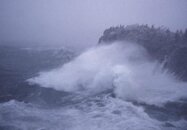Hatul
Contributor
i have a hard time seeing the benefits of deflating my BCD, so if i get knocked down by a wave instead of floating i'll sink like a rock
Just try both methods and you'll see that I'm right on this. We have some big surf here and I learned this method the hard way. However if you're diving Lake Ontario it does not really matter as there's no surf there to speak of.




